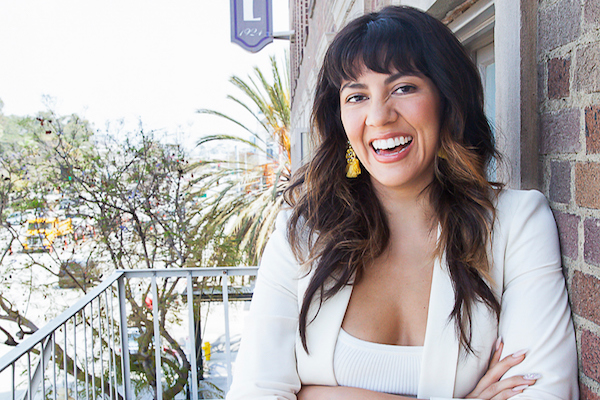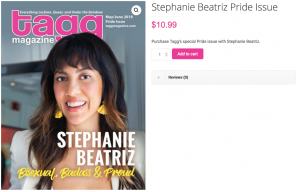Stephanie Beatriz is living a pretty charmed life. Between taking strong stances toward current events on social media, hosting her friends at parties in her apartment, planning her upcoming wedding, and spending her free time watching The Real Housewives of Potomac (“It’s the most dramatic and most hilarious one”), her life sounds just like any of ours. But unlike the rest of us, Beatriz dazzles audiences weekly as Detective Rosa Diaz on acclaimed TV show Brooklyn Nine-Nine.
PORTRAYING ROSA
If you’ve seen Brooklyn Nine-Nine, you know that while Rosa initially comes off as a secretive, tough, crime-fighting badass in a leather jacket, she also has a heart of gold. That heart comes directly from Beatriz, who explains that even though the show is—in many ways—an idealized version of the world, it’s a world she believes is possible. The comedy features a racially diverse cast and characters with different backgrounds, sexualities, and quirks, and it manages to tackle social issues with finesse and tact.
One example that struck a chord with the LGBTQ community was Rosa’s coming out as bisexual on Brooklyn Nine-Nine’s 99th episode in 2017. Beatriz says that the timing was intentional, placing not only Rosa’s coming out experience, but a positive portrayal of a bisexual character, in the spotlight. Beatriz worked closely with show creator Dan Goor to keep Rosa’s story authentic and honest.
“Queer people should be able to have input in telling their stories or tell them themselves,” she says, pointing out specific facets she felt were important in telling Rosa’s story. “For example, using the word [bisexual] was really important to me—having multiple characters say it, having it not be a sort of wrap-it-up-in-a-bow coming out story.”
“You know,” she tells me, “coming out sucks.”
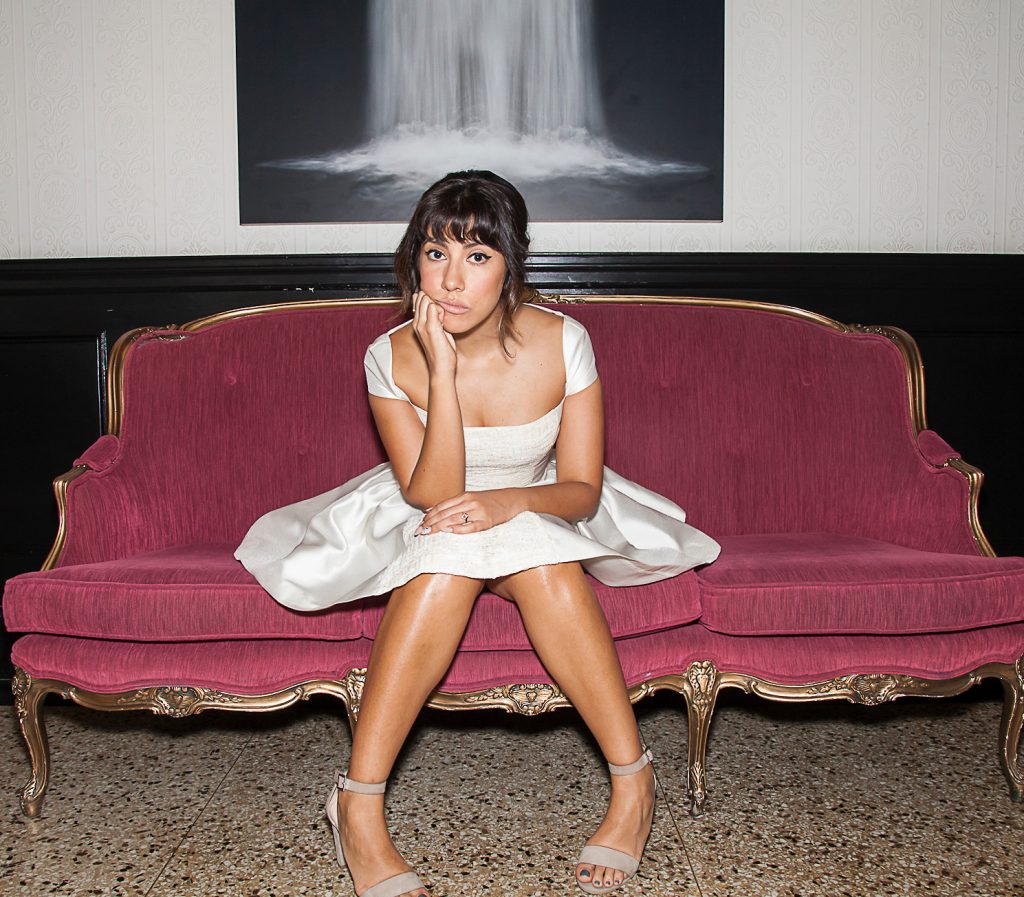
ART IMITATES LIFE
Beatriz came out publicly in July 2016 on Twitter, responding “Yup.” to a tweet quoting an Aubrey Plaza interview with The Advocate in which Plaza stated, “I fall in love with girls and guys. I can’t help it.”
“I didn’t really think about it too much: it was just a sort of off-the-cuff tweet,” Beatriz tells me. “It wasn’t a calculated plan. I don’t really share my dating life on Twitter like I do with my friends. This was a surprise to people and also, it was sort of meaningful for people.”
When Rosa followed suit the next year, Beatriz decided to attend ClexaCon, a convention celebrating LGBTQ women in media. “It’s such a cool idea!” she gushes. “It’s specifically centered around female queer characters in media and loving those characters. That’s so important because there are just not enough of them.” The actress chose a busy schedule at the convention, participating in three panels: Bisexual Representation in the Media, LGBTQ Actresses, and Queer Women of Color Representation in the Media.
“Bi representation in media is lacking and it’s usually seen in…not a great lens,” she says. “So as somebody who’s playing a character that is bi in the media, I thought it would be really cool to go. And it was!”
DISCOVERING A PLATFORM
Beatriz describes her new position as a role model as “flattering.”
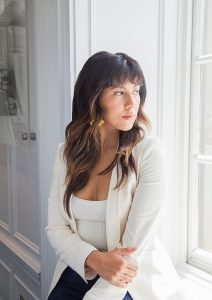
“I feel honored,” she says, explaining that her job is to tell stories through acting, and while it’s been an honor to portray Rosa and tell her particular story, it’s a whole different honor to be someone that people look up to.
It’s not a role she takes lightly.
“Essentially, because I’m on a TV show, I have a platform. People think I’m funny and I’m on a show they think is funny, so they want to see what I’m doing and what my opinions are about things.”
Beatriz recognizes that not everyone will agree with her opinions and her vision for the type of world she wants to help create. She’s also excited by the idea of bringing new ideas to people who may not have thought about them before she’s spoken or posted about them.
“But,” she is quick to point out, “a lot of people agree with me and they too are passionate about the things I’m passionate about: LGBTQIA rights, equal rights for everyone across the board, feminism, women’s rights, more representation of people of color in the media…They too think these things are valuable.”
Beatriz appears fearless as she takes strong stances on social media, and that authenticity clearly connects: her social media feeds boast almost 700,000 followers across platforms.
With her impact and involvement, does she consider herself an activist? “I think all of us, in the time that we’re living in right now, pretty much every step that you take, everything that you do, everything that you buy, everything you engage in is part of your own activism in the world,” she explains.
She clarifies, “We’re living in a very politicized time and it really is all of the choices that you make on a daily basis—they affect other people. So yeah, in that way I’m an activist.”
Delving deeper, she paraphrases Anne Frank, revealing that she believes people are really good at heart. “I think that it’s our responsibility to try to make this world a little bit better for everyone else in it.”
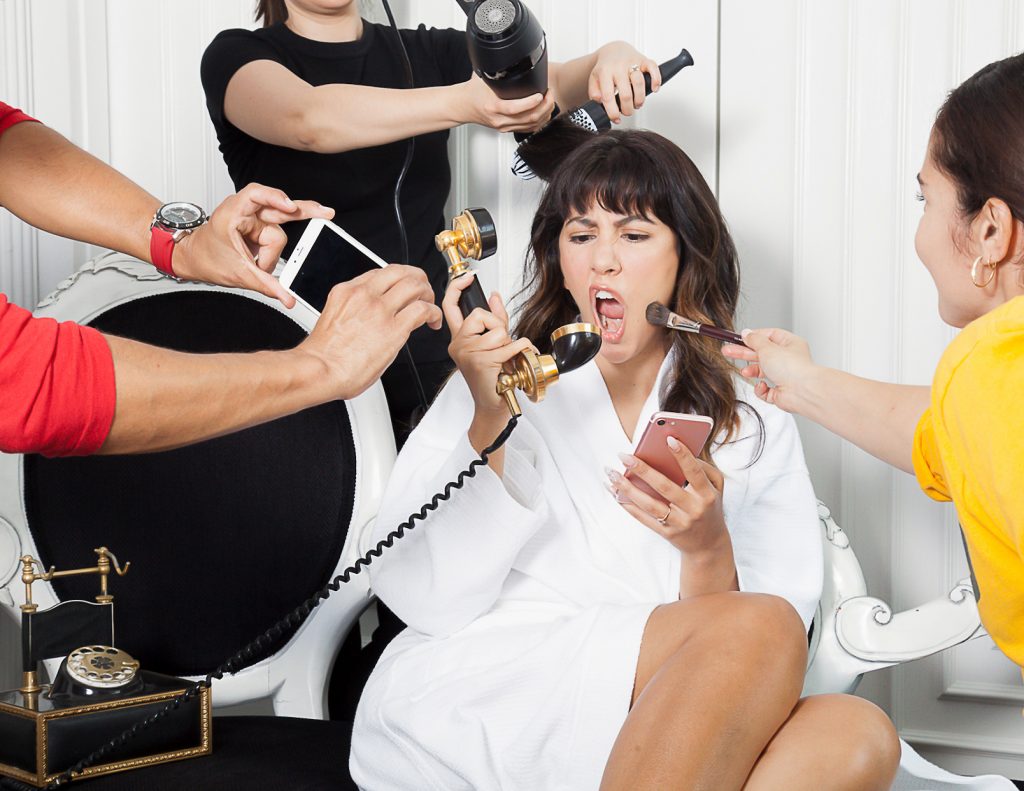
THE INNER BADASS
My interview with Beatriz takes place in the middle of a professional whirlwind for the actress. A week prior to our conversation, Brooklyn Nine-Nine was canceled by Fox, where it had aired for five seasons. The news sparked outrage from fans, critics, and fellow celebrities—Guillermo del Toro and Mark Hamill were among those who responded to the cancelation with dismay.
Beatriz tells me that the passionate outpouring of support on social media to news of the show’s cancellation felt validating—it verified the show’s connection with its audience. “We’re making TV in a little vacuum: you go to the set and you create this thing. Every week you work really hard on an episode and then a few weeks later you get to see it. And you don’t really know what the response is completely.”
Within hours of the news breaking, the show began trending worldwide on Twitter and think pieces arguing the comedy’s importance in the current political climate abounded. “I just had no idea that we had that many fans that were so loyal to the show and want to see it continue,” she says, discussing what it felt like to see such an impassioned reaction to her work.
In less than 36 hours, NBC picked up the show for a sixth season and Beatriz and the rest of the cast flew to New York to promote the show with Brooklyn Nine-Nine’s new network.
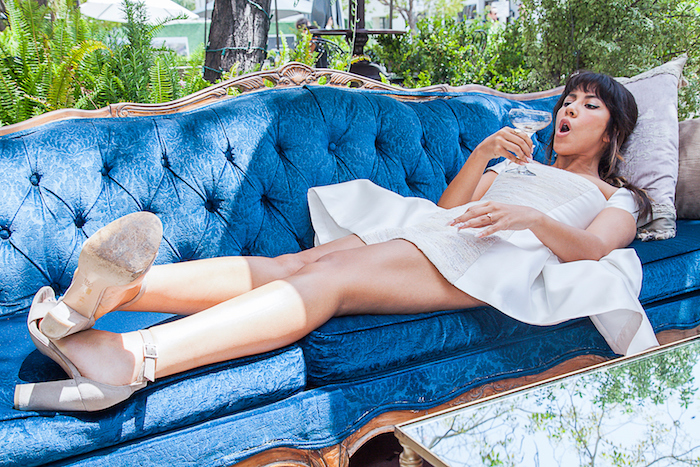
As we talk over the phone, Beatriz heads home from the airport, having landed in Los Angeles less than an hour before. I ask how she’s been the last few days, and she says, “I’m very tired, but I’m very grateful.”
“It just felt like, ‘Well, we did something,’” she says. “We put something in the world that made people happy and made people feel really good and made people feel seen. And that’s important.”
With so much talk about cancelation fresh on our minds, I ask Beatriz what legacy she hopes to entrust her character Detective Rosa Diaz? She doesn’t miss a beat before answering, “I think inside of all women, there is a place where we are all a motherfucking badass and it’s just a matter of accessing that place.”
Empowering women is a two-part process she explains: allowing vulnerabilities and revealing them to others is just as important. In looking at the women at the Nine-Nine, she says, “They’re not afraid to be [vulnerable]. I mean Rosa the least out of all of them, but they do show their vulnerabilities to each other—especially to each other.”
And just like the women at the precinct, accessing your inner badass isn’t the same for everyone. “If you feel badass and you’re like, wearing a leather jacket, if it’s when you’ve got a kid on your hip and you’re being the best mom you can possibly be, if it’s running your own empire—whatever.”
Beatriz says she’ll know Rosa’s hit her mark “if what women that watch the show walk away with is a feeling of, ‘Oh yeah, that is me! I have that. I can access it whenever I need to or want to.’”


